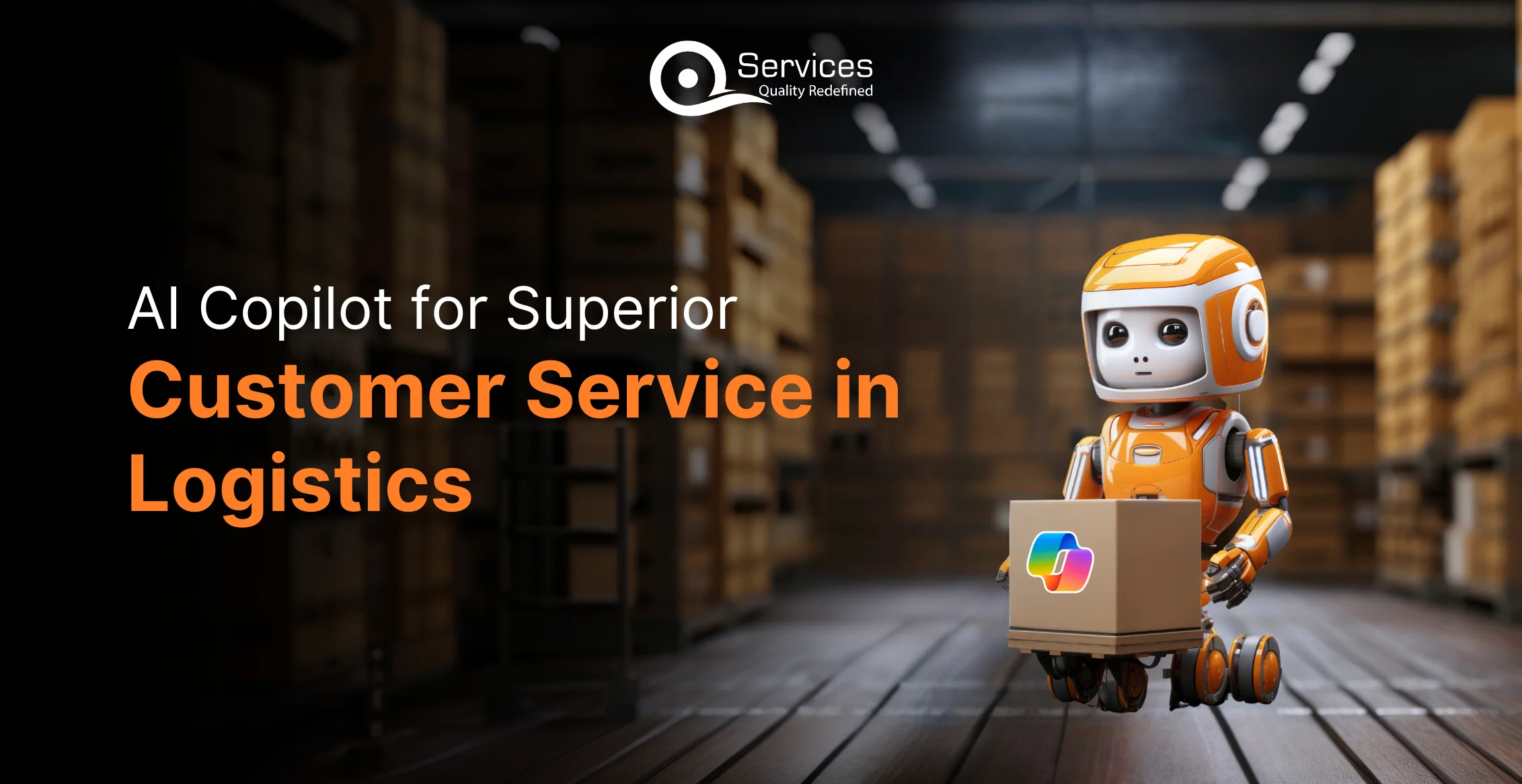Home » AI (Artificial Intelligence) Copilot for Superior Customer Service in Logistics

Customer service influences every industry, and it similarly impacts the logistics sector. Given that modern supply chains are vast and complex, comprising an intricate network of stakeholders from manufacturers to distributors, poor customer service can exacerbate this complexity, leading to inefficiencies and significant disruptions. Moreover, it can severely affect client loyalty, impeding the growth of logistics organizations and resulting in loss of business, ultimately tarnishing the company’s reputation. In this blog, we will discuss the significance of customer service in logistics and the role of AI as a copilot for a superior logistics customer experience.
A recent Forbes report mentioned that over 85% of customers will pay a 25% premium for better service.
It is impossible to overestimate the importance of offering top-notch customer service in logistics, where the smooth flow of goods is critical. Customer service, the backbone of the logistics sector, guarantees on-time delivery and promotes stakeholder loyalty and trust. Indeed, there are several reasons why the cooperation of logistics and customer service is crucial.
Providing better customer service ensures that customers have positive delivery experiences, including high order fulfilment rates, timely delivery, and transparent communication about shipment status.
An effective customer service management directly helps in influencing the company’s reputation by handling inquiries, resolving issues quickly, and maintaining open lines of communication with customers.
80% of buyers want consistent delivery status updates, with 27% going as far as to say they want notifications as often as possible, even multiple times a day. This clearly shows that improved customer service provides customers with access to real-time status updates and transparent information throughout the shipping process, leading to an enhancement of trust and satisfaction.
Quick problem resolution and timely communication of shipment delays demonstrate accountability and commitment to customer satisfaction, ultimately building trust and loyalty.
Quality customer service leads to long-term cost savings in transportation, faster delivery times, and ultimately happier customers, contributing to overall efficiency and profitability.
It costs over 6X more to attract a new customer than it does to keep an existing one. Focusing on customer retention is the key strategy for sustainable business growth, and better customer service contributes to higher customer retention rates by addressing customer queries and concerns promptly, ultimately leading to increased profitability through repeat business
Exceptional customer service enhances the brand’s image, generates positive reviews, and attracts more business opportunities, ultimately contributing to long-term success and sustainability.
One of the most important ways to differentiate a logistics company from its rivals is to provide outstanding customer service. Deeper relationships with customers can be established by a logistics company through the constant delivery of exceptional service experiences. Satisfied consumers are more likely to choose and suggest the business over its competitors, which in turn results in a stronger foothold in the market and long-term profitability enhancement.
Get free Consultation and let us know your project idea to turn into an amazing digital product.
As logistics is already acknowledged as a complex network with numerous challenges, it’s essential to recognize that maintaining customer service within it poses a challenging task. Here, we delve into how poor customer service management can lead several challenges in logistics, including:
Poor customer service by a logistics company can lead to a decrease in client loyalty. This means that clients become less loyal to the company, perhaps seeking services from competitors instead. Consequently, the logistics organization may experience a loss of business, as clients choose to take their business elsewhere, and the company’s reputation can suffer negatively due to this diminished client loyalty and loss of business.
Low-rate technology adoption can lead to inaccurate inventory information. For example, insufficient integration of AI in logistics operations can result in inaccurate inventory information and data processing, leading to challenges in order fulfilment and ultimately contributing to customer dissatisfaction.
Poor logistics management can have negative financial implications. Specifically, it suggests that inefficient management practices can result in lower transportation charges but higher fuel expenses. This combination can lead to increased overall operational costs and decreased profit margins for the company involved.
The inability of a logistics company to offer real-time status updates at each stage of the shipping process can result in a loss of trust among its clients. This suggests that clients expect transparency and timely information regarding the progress of their shipments, and if this expectation is not met, it may lead to dissatisfaction and a diminished perception of the company’s reliability and competency.
Effective communication about shipment delays is critical for a company. If the company fails to convey these delays to customers in a timely and clear manner, it can result in dissatisfaction among customers, which surely leads to negative perceptions among customers and potentially impacts future business opportunities.
The Microsoft Copilot AI is transforming logistics, ensuring a smooth shipment and delivery process for customers. Here are some key points highlighting its significant role in customer service logistics.
According to research undertaken by the National Bureau of Economic Research, AI Copilot can raise agent productivity in logistics by 14% on average, and by up to 34% in the case of new or less experienced employees. AI Copilot frees up agents to spend more time and energy on delivering the personal touch that is essential for building client loyalty and trust in the logistics industry by automating repetitive requests and laborious duties like data entry.
Through interactions with AI-powered agents, customers consistently rate their experiences more positively. The AI Copilot employs advanced data analysis and predictive capabilities, enabling agents to personalize their responses based on individual customer needs. This proactive approach allows agents to anticipate potential concerns and address them preemptively, thus mitigating issues before they have a chance to escalate, thereby enhancing the overall customer experience within the logistics domain.
When agents are provided with AI co-pilots, they experience positive changes in their work environment. This includes feeling less stressed, more satisfied with their job, and having a clearer sense of purpose. With AI handling repetitive tasks, agents can step away from monotonous work and focus more on building relationships and connections with customers. This shift allows them to become better at understanding and meeting customer needs, leading to stronger bonds with them.
AI Copilot, functioning as a custom chatbot, serves as a virtual mentor, continuously analyzing successful interactions to offer insightful feedback. This feedback loop is essential for ongoing learning and improvement. AI Copilot achieves this by generating contextually relevant responses to customer inquiries across various communication channels like chat and email, while also effectively summarizing cases and conversations. Essentially, it acts as an advanced knowledge repository, leveraging past successful interactions to optimize and streamline customer engagements in logistics.
AI Copilot steps in as a vital tool, spearheading the automation of information processing tasks, especially within custom chatbot development services. By meticulously analysing incoming queries, whether through its custom chatbot chat interfaces or email correspondence, AI Copilot crafts responses tailored to the specific context of each inquiry. Moreover, it alleviates the burden on human agents by readily providing answers to their questions and synthesizing complex cases and conversations into concise summaries. In essence, AI Copilot acts as a digital assistant, streamlining the flow of information within the logistics ecosystem, thereby enhancing productivity and decision-making capabilities.
AI copilot address critical challenges encountered by customer service agents, notably in information retrieval and response accuracy. They facilitate swift access to necessary information, significantly reducing the time agents spend searching for answers. As a result, resolution times are shortened, enhancing overall efficiency and customer satisfaction.
AI Copilots have the ability to analyse large volumes of data and detect patterns that indicate future market trends. By utilizing advance algorithms and machine learning, AI Copilots can forecast changes in the market with accuracy. This foresight enables businesses in the logistics industry to make strategic decisions about how to allocate their resources effectively.
AI-powered systems can enhance supply chain operations by leveraging historical data and real-time information. By analyzing this data, these systems can predict demand patterns, anticipate inventory fluctuations, and identify potential disruptions in the supply chain. With this foresight, companies can optimize their inventory levels, ensuring they have the right amount of stock on hand to meet demand while minimizing excess inventory or stockouts. Additionally, by streamlining supply chain operations based on these insights, companies can improve efficiency and reduce costs throughout the supply chain process. Overall, AI-powered systems play a critical role in optimizing supply chain operations by providing valuable insights and enabling proactive decision-making.
Customer service is crucial in logistics, impacting operations significantly. Challenges such as diminished loyalty, data inaccuracies, rising costs, and transparency issues can arise. AI Copilot technology offers solutions, allowing companies to enhance service standards, differentiate, and achieve sustainable growth. Effective implementation requires partnering with a reliable custom chatbot development service provider to maximize AI Copilot’s potential.

Content Moderator

Founder and CEO

Chief Sales Officer
